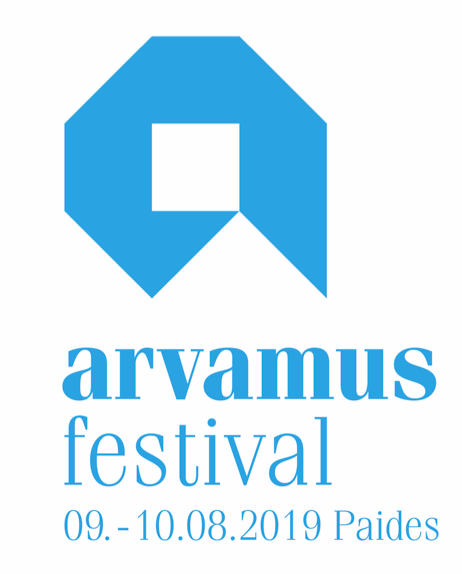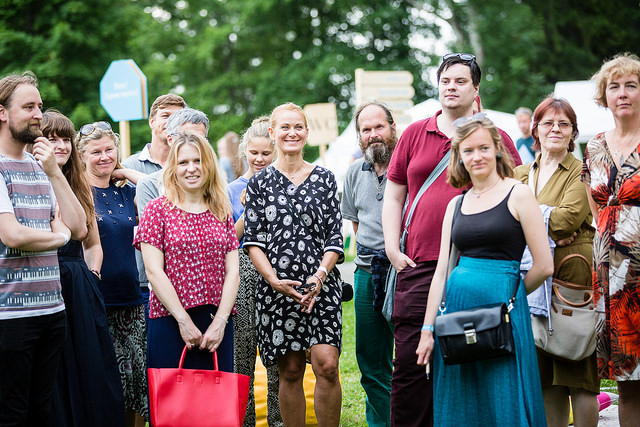This year’s Opinion Festival will treat participants to 12 English-language discussions, ranging from topics such as national security to information warfare to the transition away from cowboy capitalism. Special attention will be paid to the nature of democracy and the future of the three Baltic countries who are all celebrating their centenaries in 2018.
Taking place for the sixth consecutive time, this year’s Opinion Festival continues a trend we have been seeing in the last few years: the 12 discussions, out of 160 discussions in total, show a rise in the number and diversity of events at the festival hosted in English and featuring international speakers.
While the English-language discussions are spread across the Festival’s six key themes (values, community, policymaking, security, employment and market, and education), participants looking for topics with an international focus are spoilt for choice in two discussion areas in particular: the Democracy Area and the Estonia, Latvia, Lithuania 2038 Area.
While nurturing participatory democracy has been at the heart of the Opinion Festival since inception, this is the first time there will be a discussion area dedicated solely to the concept and practice of democracy. The timing for the Democracy Area, hosted by the Nordic Council of Ministers’ Office in Estonia, is not accidental: with recent landshift changes in international politics, there is hardly a better time to take a step back and think about what it means to live in and nurture a democratic society. This deep dive into the meaning of democracy also coincides with the launch of the Democracy Festivals platform earlier this year which brings together different events promoting participatory democracy in Estonia, Sweden, Finland, Denmark, Iceland, Norway, Latvia and Lithuania.
When on Friday the discussions will be assessing what Estonia could still learn from the Nordics, whether on the more fundamental level of social and foreign policy or when it comes to entrepreneurship, the discussions on Saturday will give participants the opportunity to expand beyond their immediate region of the Nordics and Baltics and instead explore opportunities and challenges for the whole of European civil society through the example of Poland, Hungary and Germany. Activists from these countries will share their experience and know-how. Another area of focus on the second day of the festival will be the European Capital of Culture, with several Estonian cities vying for the title for 2024.
Another area that stands out for its international focus is the Estonia, Latvia, Lithuania 2038 area. As the name suggests, the area will be tackling questions about the future sustainability of the three Baltic countries. What is the financial portrait of people in the Baltics? How to give young people opportunities to fulfill themselves and in a global world encourage them to contribute to these small societies on the edge of Europe? Led by Swedbank and welcoming speakers from all three Baltic countries, there are just some of the discussions taking over two days.
Beyond these two discussion areas, other English-language events are dotted around the festivals. There will be a human library, organised by the Estonian Refugee Council, where participants can hear and engage with the stories of refugees and immigrants. Another discussion of note takes place in the Foreign Policy Area on Friday, with media and strategic communications experts from Ukraine, Finland and Estonia inviting participants to debate the issue of information warfare which is increasingly rearing its head in Europe and globally.
This year’s programme, as in previous years, has been the grassroots effort of hundreds of organisations and individuals across sectors and creeds. As such, it holds up a mirror to the main areas of interest, concern and hope for local citizens. The diversity of themes and participants in the Festival’s English-language programme is one such reflection.
You can find all the discussions and events in English programme below and here. The full programme is available here, including details of the Festival’s busy culture programme of exhibitions, parties and performances.
10 August
Are the Nordic Countries Still a Role Model for Estonians?
10 August 2018 @ 14:00-15:30
Democracy area (Demokraatia ala)
Participants: Kirsti Narinen (Ambassador, Finnish Embassy in Estonia) Taavi Rõivas (MP, Former Prime Minister of Estonia), Kai Klandorf (Executive Director, Network of Estonian Nonprofit Organizations)
Moderator: Christer Haglund (Director of the Nordic Council of Ministers’ Office in Estonia)
Organizer: Nordic Council of Ministers’ Office in Estonia (NORDEN)
From Cowboy Capitalism to Value-Based Entrepreneurship
10 August 2018 @ 16:00-17:30
Democracy area (Demokraatia ala)
Participants: Kati Ihamaki (Director, Sustainable Development, Finnair), Maria Wetterstrand (former spokesperson for the Swedish Green Party and parliamentarian), Raul Lättemägi (Owner, AS Advanced Sports Installations Europe)
Moderator: Annika Arras (partner et Miltton Nordics)
Organizer: Nordic Council of Ministers’ Office in Estonia (NORDEN)
Human Library “Immigrants”
10 August 2018 @ 16:30-17:30
Discussion Culture area (Suhtluskultuuri ala)
Participants: Refugees, immigrants, foreigners living in Estonia
Moderator: Polina Polyakoff (NGO Estonian Refugee Council)
Organizer: Estonian Refugee Council
Manipulation and Information Warfare
10 August 2018 @ 18:00-19:30
Foreign Policy area (Välispoliitika ala)
Participants: Oleksii Makuhin (expert of the Ukrainian Crisis Media Centre), Raul Rebane (strategic communications expert), Anneli Ahonen (team member of EU East StratCom Task Force)
Moderator: Jarmo Mäkela (Finnish analyst with international media experience; columnist at Postimees)
Organizer: Estonian Center of Eastern Partnership
Who is the Richest – Jaan, Janis or Justas? A Financial Portrait of the Baltics
10 August 2018 @ 12.00-13.30
Estonia, Latvia, Lithuania 2038 area (Eesti, Läti, Leedu 2038)
Participants: Kristjan Tamla (Director, Investment Funds, Swedbank), Leonore Riitsalu (NGO Rahatarkus), Vaidotas Šumskis (Chief Economist, Bank of Lithuania), Sanita Gertmane (Latvian Consumer Rights Protection Centre)
Moderator: Kati Voomets (Director, Institute for Private Finances, Swedbank)
Organizer: Swedbank Estonia
“Mina jään,” “aš lieku”,” “es palieku !” Baltic countries: A Disappearing Nation?
10 August 2018 @ 14.00-15.30
Estonia, Latvia, Lithuania 2038 area (Eesti, Läti, Leedu 2038)
Participants: Mikk Tarros (Vice-Chairman, Estonian National Youth Council), Emīls Anškens (Chairman, Latvian Youth Council), Urtė Petrulytė (Board Member, Lithuanian Youth Council), Juris Vilums (Parliament of Latvia), Rainer Vakra (Parliament of Estonia)
Moderator: Annaliisa Jäme (Consultant, Parliament of Estonia)
Organizer: Estonian National Youth Council
Career – Choice or Stereotype? Are the Baltics Looking for New People?
10 August 2018 @ 16.30-18.00
Estonia, Latvia, Lithuania 2038 area (Eesti, Läti, Leedu 2038)
Participants: Kätlin Kuldmaa (Estonian UN Youth Delegate), Fredrik Nilzen (Head of Sustainability, Swedbank Group), Mari-Ann Lumeste (Counselor to the Estonian Equality Commissioner), Deepak Ahluwalia (Deputy Sales Director, Nordica), Toomas Kruusimägi (Headteacher, Tallinn English College; President, Estonian School Heads Association)
Moderator: Liisa Pakosta (Estonian Gender Equality and Equal Treatment Commissioner)
Organizer: Liisa Pakosta (Estonian Gender Equality and Equal Treatment Commissioner)
11 August
Civil Society in Europe: Who, Why and How Should Be Mobilized?
11 August 2018 @ 14:00-15:30
Democracy area (Demokraatia ala)
Participants: Miklos Marschall (founding Executive Director, CIVICUS; former Deputy Managing Director, Transparency International; former Deputy Mayor of Budapest – Hungary), Jakub Wygnański (sociologist, activist and co-founder of a number of NGOs – Poland), André Wilkens (CEO, Offene Gesellschaft; former Director, the Mercator Centre Berlin – Germany)
Moderator: Sigrid Solnik (Estonian Roundtable for Development Cooperation)
Organizer: Open Estonia Foundation
European Culture Capital 2024: For Whom and Why?
11 August 2018 @ 16:00-17:30
Democracy area (Demokraatia ala)
Participants: Suvi Innilä (Programme Leader, Turu 2011 European Capital of Culture – Finland) Ib Christensen (Head of Municipality Cultural Department, Aarhus 2017 – Denmark), Helen Sildna (Shiftworks; Team Member, Narva 2024 initiative – Estonia), Berk Vaher (Bidbook Editor, Tartu 2024 European Capital of Culture candidate city – Estonia)
Moderator: Laur Kaunissaare (Dramaturg, Theatre NO99; Programme Coordinator, Tallinn 2011 European Capital of Culture)
Organizer: Nordic Council of Ministers’ Office in Estonia (NORDEN)
Divided We Fall, United We Stand: Is Polarisation of Societies Undermining Security of the Baltic States?
11 August 2018 @ 12.00-13.30
Estonia, Latvia, Lithuania 2038 area (Eesti, Läti, Leedu 2038)
Participants: Dr Kęstutis Girnius (Associate Professor, the Institute of International Affairs and Political Science of Vilnius University); Dr Mārtiņš Kaprāns (Researcher, the Institute of Philosophy and Sociology of the University of Latvia; Advisor, the Latvian Ministry of Culture); Dr Anu Realo (Associate Professor, the Department of Psychology of University of Warwick; Professor of Personality and Social Psychology, University of Tartu); Dr Volodymyr Ishchenko (Lecturer, the Department of Sociology of Kyiv Polytechnic Institute)
Moderator: Tomas Jermalavičius (Head of Studies and Research Fellow, ICDS)
Organizer: International Centre for Defence and Security (ICDS)
Building Trends in the Baltics in 2038
11 August 2018 @ 16.00-17.30
Eesti, Läti, Leedu 2038
Estonia, Latvia, Lithuania 2038 area (Eesti, Läti, Leedu 2038)
Participants: Raimonds Jansons (Ambassador of Latvia in Estonia), Eneli Liisma (Head of Quality Management Department, AS Merko Ehitus Eesti), Rene Vinkler (Sales manager, Sakret OÜ)
Moderator: Kaspars Pacevics (CEO, Board Member, Sakret OÜ)
Organizer: Sakret OÜ
Learning through Activity
11 August 2018 @ 12:30-13:30
Children’s Discussions (Lastearutelud)
Participants: Lea Tornberg (Finnish teacher and creator of innovative teaching methods)
Moderator: Mario Mäeots
Organizer: Finnish Institute in Estonia

